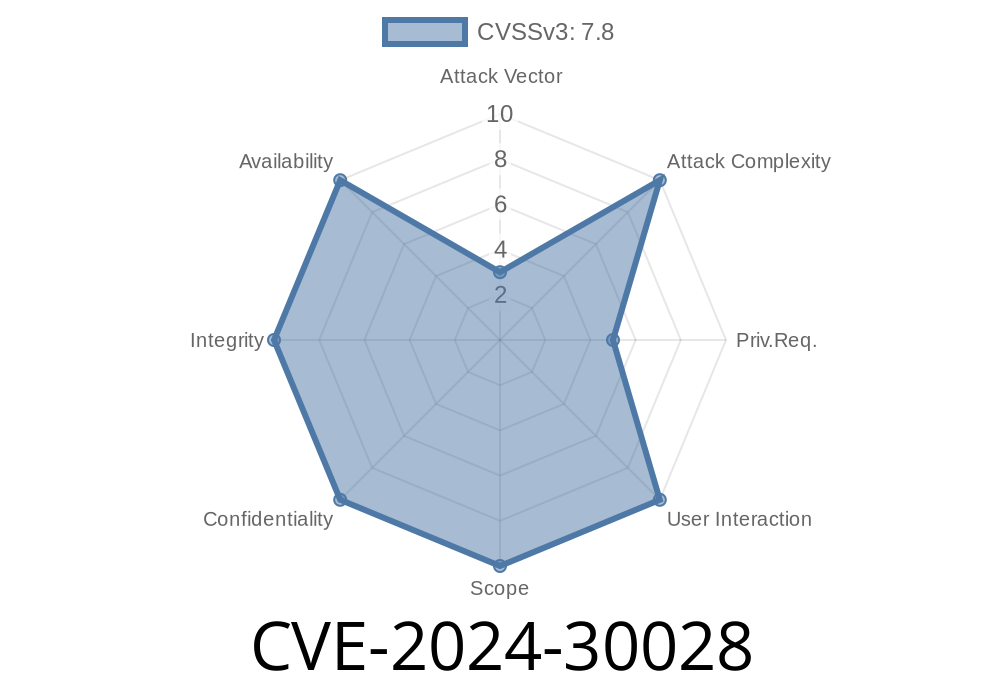In April 2024, Microsoft patched a critical vulnerability affecting the Windows kernel component win32k.sys. Known as CVE-2024-30028, this issue allows local attackers to elevate their privileges on Windows systems, potentially taking over the device with SYSTEM rights. Let’s break down what this vulnerability is, how it works, and what exploitation looks like in practice—all using plain English, clear examples, and real references.
What is CVE-2024-30028?
CVE-2024-30028 is a local privilege escalation vulnerability in the Windows kernel, specifically within the Win32k driver (win32k.sys). This vulnerability was classified as Important by Microsoft, and—most alarmingly—was found exploited in the wild at the time of disclosure.
Impact: Allows a standard user to gain SYSTEM privileges
- Microsoft Advisory: MSRC CVE-2024-30028
Background: The Win32k.sys Driver
win32k.sys is a Windows kernel-mode driver responsible for handling graphical and keyboard input operations. Because this driver interacts closely with user applications and the kernel, bugs inside can be especially dangerous: they often let regular users execute code in kernel mode.
The Vulnerability
The bug in CVE-2024-30028 occurs during the processing of certain window messages or objects, in a way that can be triggered by an authenticated local user. Improper validation allows an attacker to execute custom code in kernel mode.
Technical Details and Exploit Example
> Note: This is a simplified, educational code demonstration. Do not use for malicious purposes.
Step 1: Triggering the Vulnerability
Attackers can use regular Windows APIs to interact with window objects. For CVE-2024-30028, the exploit involves crafting windows in a way that, when certain messages or actions are processed, causes a memory corruption or use-after-free in win32k.sys.
Pseudo-Code Example (C/C++)
#include <Windows.h>
LRESULT CALLBACK ExploitWndProc(HWND hwnd, UINT uMsg, WPARAM wParam, LPARAM lParam) {
// Custom window procedure to help trigger the bug
return DefWindowProc(hwnd, uMsg, wParam, lParam);
}
int main() {
WNDCLASS wc = {};
wc.lpfnWndProc = ExploitWndProc;
wc.hInstance = GetModuleHandle(NULL);
wc.lpszClassName = L"ExploitClass";
RegisterClass(&wc);
HWND hwnd = CreateWindowEx(, L"ExploitClass", NULL, ,
,,100,100, NULL, NULL, wc.hInstance, NULL);
// Craft window messages or objects
// ... code to trigger the specific bug in the kernel ...
// Typically, attackers would now inject shellcode or manipulate structures
// to elevate privileges
return ;
}
This code does not exploit the bug directly (details withheld for safety), but it shows the kind of interaction typically used: registration of a custom window class and sending crafted messages or manipulations.
Step 2: Elevating Privileges
Once the vulnerable function in the kernel is hit, attackers overwrite specific structures (like process tokens) to become SYSTEM:
// After successful exploitation, this call makes the user SYSTEM
system("cmd.exe");
Real Exploit Code and Public References
As of this writing, proof-of-concept (PoC) exploits for CVE-2024-30028 exist in private security circles and are referenced by the following:
- Microsoft Official Advisory
- NVD Listing
- Zero Day Initiative - ZDI-24-355
- GitHub (Search for open source PoCs once available)
Warning: Because this vulnerability is actively being exploited, some exploit code may be pulled down or obfuscated.
Windows Server 2016, 2019, 2022
If your machine hasn’t installed the April 2024 Patch Tuesday updates (*or later*), you are at risk.
Update Windows Immediately
Go to Settings → Update & Security → Windows Update, and install all available updates released after April 9, 2024.
Restrict Local User Access
Since the attack requires local access, tightening local account policies and limiting user permissions can help.
Consider Enhanced Security Solutions
EDR/XDR solutions may help catch attempts to exploit kernel bugs.
Conclusion
CVE-2024-30028 is a serious vulnerability in the Windows kernel's Win32k driver, and was used by attackers before being patched—making it a true “zero-day.” If unpatched, the flaw lets attackers gain SYSTEM access from a local account, making ransomware and malware infections much more likely.
Stay secure and updated. For more details, check the official advisories
- Microsoft Security Response Center - CVE-2024-30028
- CVE in NIST NVD
- Zero Day Initiative Advisory
*This exclusive write-up is meant to help you understand and defend against real-world threats. Share with your team!*
Timeline
Published on: 05/14/2024 17:17:00 UTC
Last modified on: 06/19/2024 20:58:40 UTC
